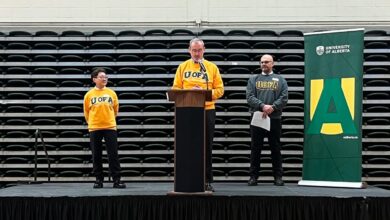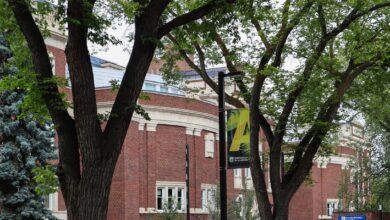Notes from Council: Members discuss remuneration, oppose implementation of AMP
“In a world where you can barely afford your groceries, we shouldn't be limiting ourselves from asking for fair compensation for work that we do,” law councillor Damon Atwood says.
 Helen Zhang
Helen Zhang“Notes from Council” is The Gateway’s ongoing series of recaps of noteworthy items from Students’ Council meetings.
On October 10 at Students’ Council, the University of Alberta Students’ Union (UASU) General Manager, Marc Dumouchel, presented on council remuneration, sparking debate on whether councillors should be compensated. As well, council opposed the Academic Materials Program (AMP).
During executive reports, Vice-president (academic) Pedro Almeida mentioned that the faculty of science has approved an Indigenous course requirement to be implemented by fall 2024.
Jacob Verghese, the UASU’s chief returning officer, discussed voter turnout of the recent fall by-election, which was 1.89 per cent. Verghese attributed lower voter turnout to there being less “contested positions” for students to vote for.
“We do not want to devalue one set of work over another,” UASU general manager says
In the past, council’s budget principles included financial compensation for councillors, Dumouchel said. Compensation ranged from $500 to $1,333 per year, depending on the person’s role in council and their committee involvement.
He said councillors were compensated to increase their productivity, as well as encourage greater diversity and participation in council. Even with remunerations, these objectives were not met, Dumouchel said. In 2008, remunerations were removed from budget principles as a result. In 2021, the restructuring task-force recommended compensating councillors, in conjunction with reducing council’s size. Council was cut down to 19 councillors, but remunerations were not finalized.
Dumouchel said that the administrative cost of compensating councillors is “relatively low.” However, he has concerns about the possible impact it could have on UASU volunteerism. Remunerating councillors would make volunteers that “spend more hours per year on volunteer engagement” than councillors, doing “emotionally intensive, labour intensive work,” question why they’re not getting paid.
“We do not want to devalue one set of work over another,” Dumouchel said.
He added that getting rid of volunteerism in the UASU is not an option. If councillors “were to abolish volunteerism,” it would not only alter service delivery in the UASU, but also cause financial challenges.
“Volunteers provide about $1.2 to $1.5 million worth of labour at minimum wage,” Dumouchel said. “There is no intention to get rid of [volunteerism]. We couldn’t afford to, to be blunt.”
He said that there are other ways of achieving greater participation, such as reallocating the money for councillor remuneration to a bursary fund for volunteers.
Councillors have differing opinions on remunerations
After Dumouchel presented, councillors discussed the possibility of remuneration. Law councillor Damon Atwood said that there’s hesitancy from students to ask for compensation for their work.
“A lot of people take advantage of students for that reason,” Atwood said. “In a world where you can barely afford your groceries, we shouldn’t be limiting ourselves from asking for fair compensation for work that we do.”
In opposition, arts councillor Nathan Thiessen said that compensation is “nothing more than a band-aid [for] greater concerns with UASU engagement.” Since 2018, interest in faculty and department associations has fallen, Thiessen said. Student governance has also “suffered a decrease in interest.” Thiessen added that the UASU both needs an increase in awareness, and needs to “assume governance and advocacy as a form of serving one’s community.”
“Could it help me, dedicating this time toward a job?” Thiessen said. “Most likely, but to be quite frank, it’s about serving one’s community.”
Councillors oppose implementation of AMP
Almeida and UASU President Christian Fotang moved to receive council’s endorsement for the UASU’s oppositional position on AMP. The program, proposed by bookstore manager Adam Medaglia, would charge undergraduate students a flat-fee for digital access to course materials with the option to opt-out.
Thiessen said that AMP is “clearly out of touch with students’ needs and concerns.”
“With the rising costs of living, imposing upon students a higher cost on academic materials is certainly not to their benefit,” Thiessen said. “Students are already broke as is.”
Faculte Saint-Jean councillor Jillian Aisenstat added that the program “completely undermines the Zero Cost Textbook initiative,” a program she said has benefited her.
“I probably haven’t even paid close [to] … in my almost three years what AMP is asking one student to pay per semester. I can’t endorse this program,” Aisenstat said. She also added that AMP is not “something that is going to drive equity at the U of A.”
Councillors unanimously voted to oppose implementation of AMP. The motion passed.
UPDATE: This article was updated October 19, 1:13 p.m. to clarify that engagement from faculty and department associations in the UASU has not decreased. The Gateway regrets this error.




